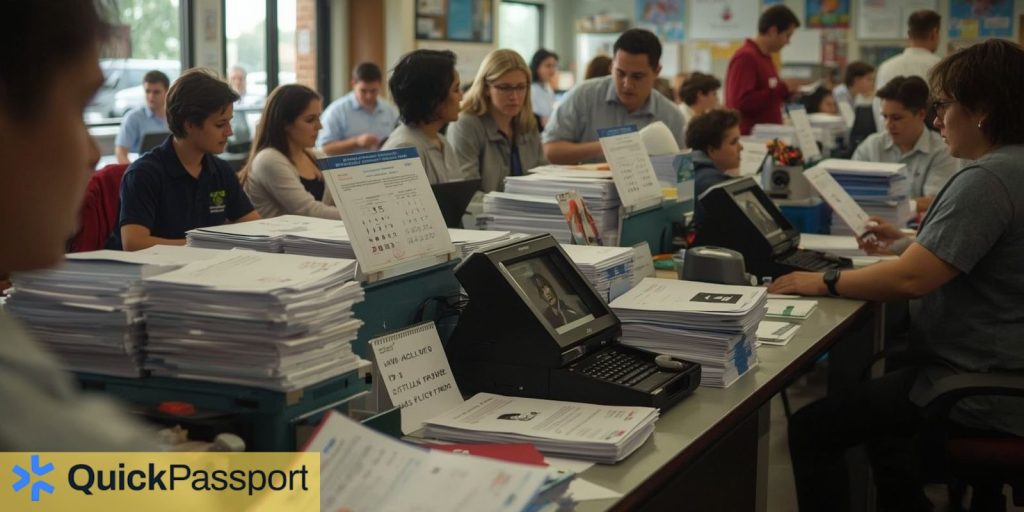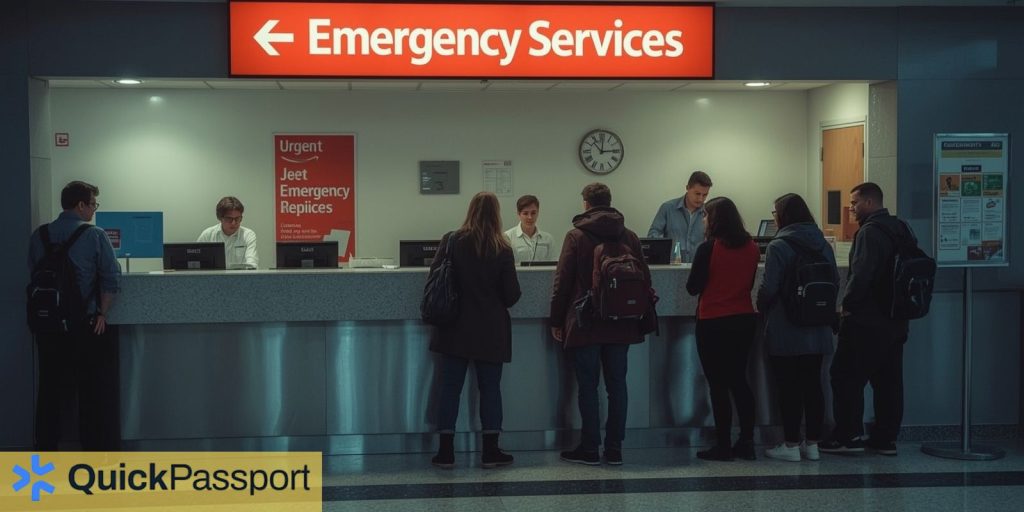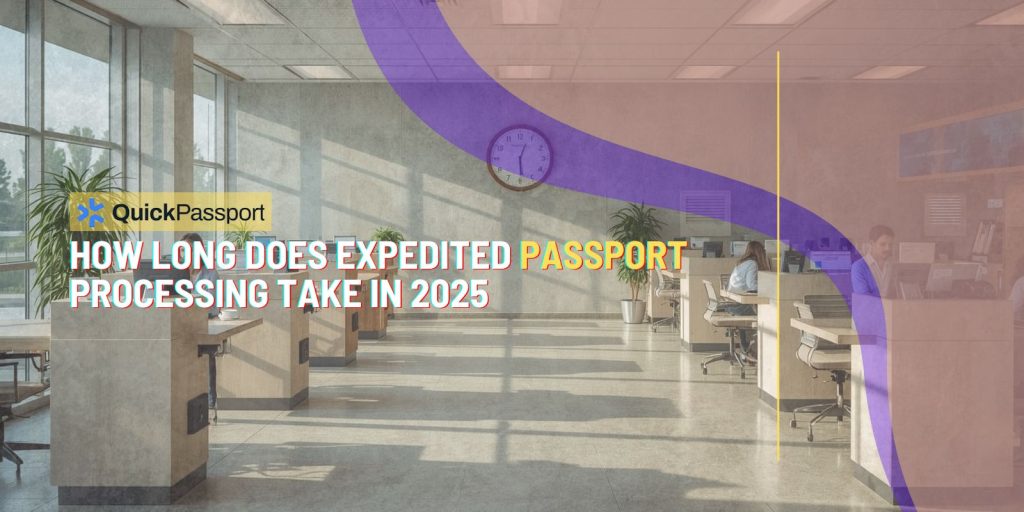When you need a passport urgently, understanding expedited processing timelines becomes crucial for your travel plans. Whether you’re facing a last-minute business trip, family emergency, or simply realized your passport has expired before a long-awaited vacation, expedited passport processing can be a lifesaver. However, many travelers find themselves asking the critical question: how long does expedited passport processing take in 2025?
The answer isn’t always straightforward, as processing times can vary based on several factors including the time of year, current application volumes, and the specific type of service you choose. In 2025, the U.S. State Department has worked to streamline processes and reduce wait times, but understanding the realistic timeframes and available options remains essential for proper travel planning.
Expedited passport processing represents a premium service that prioritizes your application over standard processing requests. This service comes with additional fees but can significantly reduce the time between application submission and receiving your new passport. For many travelers, this investment proves worthwhile when weighed against the potential costs of delayed or cancelled travel plans.
The landscape of passport processing has evolved considerably in recent years, particularly following the challenges posed by the COVID-19 pandemic. Government agencies have implemented new technologies and procedures to handle increased demand while maintaining security standards. These changes have influenced current processing times and continue to shape the expedited services available to travelers.
Understanding your options for expedited processing involves more than just knowing the basic timeframes. Factors such as whether you’re applying for a first-time passport, renewal, or replacement can affect processing speed. Additionally, the method you choose for application submission – whether through a passport acceptance facility, regional agency, or specialized service like QuickPassport in Seattle – can impact your overall timeline and experience.
Key Takeaways
- Standard expedited processing typically takes 7-9 weeks in 2025, compared to 10-13 weeks for routine processing, representing a significant time savings for urgent travel needs.
- Emergency passport services can provide same-day processing for qualifying life-or-death emergencies or urgent travel within 14 days, though availability is limited and requires proof of emergency.
- Expedited fees cost an additional $60 on top of standard passport fees, making the total cost $165 for adult passport books with expedited processing.
- Processing times vary by season, with spring and summer months typically experiencing longer wait times due to increased travel demand and application volumes.
- Third-party expediting services can reduce timelines further, often providing processing within 2-3 weeks through specialized handling and direct agency relationships.
- Incomplete applications cause the most delays, emphasizing the importance of double-checking all documentation, photos, and forms before submission.
- Regional passport agencies offer faster service for travelers with confirmed travel within 14 days, though appointments are required and often difficult to secure.
- Renewal applications generally process faster than first-time applications, as they require less verification and documentation review.
Current Expedited Passport Processing Times Overview
As of 2025, the U.S. State Department has established clearer guidelines for expedited passport processing times, though these represent estimates rather than guarantees. The current expedited processing time stands at 7-9 weeks from the date your application is received at a processing facility. This timeline represents a significant improvement from the extended delays experienced during 2021 and 2022.

These processing times apply specifically to expedited service requests and do not include mailing time to and from the processing facility. When factoring in mail delivery, applicants should expect to receive their expedited passports within 8-10 weeks total. The State Department emphasizes that these are current estimates and can change based on application volumes and operational factors.
It’s important to understand that the 7-9 week timeframe begins when your application reaches the processing facility, not when you submit it at a local acceptance facility. This distinction can add several days to your overall timeline, particularly if you submit your application at a post office or other acceptance facility that batches applications before forwarding them to processing centers.
The improvement in processing times reflects the State Department’s efforts to address the backlog that accumulated during the pandemic. Increased staffing, enhanced technology systems, and streamlined procedures have all contributed to more predictable and faster processing times. However, seasonal variations still occur, with peak travel seasons typically experiencing longer processing times even for expedited applications.
Factors That Affect Expedited Processing Speed
Several key factors can significantly impact how long your expedited passport processing actually takes, potentially extending or shortening the standard 7-9 week estimate. Understanding these variables helps set realistic expectations and allows for better travel planning.
Seasonal demand represents one of the most significant factors affecting processing times. Spring and summer months, particularly March through August, see dramatically increased application volumes as families prepare for summer vacations and study abroad programs. During these peak periods, even expedited applications may approach the longer end of the estimated timeframe or occasionally exceed it.
The completeness and accuracy of your application plays a crucial role in processing speed. Applications with missing documentation, incorrect information, or poor-quality photos often require additional review or may be returned for correction, adding weeks to the processing time. Common issues include photos that don’t meet strict requirements, incomplete forms, missing supporting documents for name changes, or insufficient proof of citizenship.
Your specific passport needs also influence processing time. First-time adult passport applications typically require more thorough review than renewals, as they involve verification of identity and citizenship. Passport renewals, when eligible, generally process more quickly since much of the verification has already been completed. Child passport applications often take longer due to additional requirements for parental consent and identity verification.
Geographic location can affect processing times as well. Applications submitted in areas with high population density or significant travel activity may experience longer processing times due to higher volumes at regional facilities. Additionally, the distance between your local acceptance facility and the processing center can impact overall timelines.
Special circumstances such as name changes, damaged passports, or lost passports require additional documentation and verification steps that can extend processing times. These situations often require manual review by passport specialists, which takes longer than standard automated processing procedures.
Emergency and Life-or-Death Situations
For travelers facing genuine emergencies, the State Department offers emergency passport services that can provide much faster processing than standard expedited service. These services are reserved for specific qualifying situations and require substantial documentation to prove the emergency nature of travel needs.
Life-or-death emergencies represent the highest priority for emergency passport processing. These situations include serious illness, injury, or death of immediate family members abroad that require urgent travel. For qualifying life-or-death emergencies, passports can often be processed within 72 hours, and in some cases, same-day service may be available at regional passport agencies.
Urgent travel situations, defined as travel within 14 days, also qualify for emergency processing through regional passport agencies. This service requires proof of imminent travel, such as airline tickets or hotel reservations, along with completed passport applications and supporting documents. Appointments at regional agencies are mandatory and often difficult to secure due to high demand.
The documentation requirements for emergency services are stringent and must clearly demonstrate the urgent nature of travel. For medical emergencies, this typically includes letters from doctors or hospitals detailing the situation. For death-related emergencies, death certificates or funeral home documentation may be required. Business emergencies generally do not qualify unless they involve life-or-death situations.
Emergency passport processing comes with additional fees beyond standard expedited processing. The emergency fee structure varies depending on the specific service level required, but travelers should expect to pay significantly more than standard expedited fees. Despite the higher costs, these services can be invaluable when facing genuine emergencies.
Regional passport agencies in major cities provide emergency services, but capacity is limited and appointments fill quickly. The Seattle region, served by facilities like QuickPassport – Seattle, often experiences high demand for emergency appointments, particularly during peak travel seasons. Planning ahead and having all documentation ready becomes crucial when seeking emergency services.
Third-Party Expediting Services
Third-party passport expediting services offer an alternative approach to faster passport processing, often providing significantly reduced timelines compared to standard government expedited service. These private companies specialize in navigating the passport application process and maintaining relationships with processing facilities to expedite applications more efficiently.

Professional expediting services typically offer processing times ranging from 24 hours to 3 weeks, depending on the service level selected and current processing conditions. The fastest services, often called “same-day” or “24-hour” processing, require hand-delivery to regional passport agencies and come with premium pricing. More standard expedited services through third-party providers often deliver passports within 1-2 weeks.
The process with third-party services usually involves submitting your application and documents to the expediting company, which then handles submission to the appropriate government facility. These companies often have established relationships with regional agencies and understand the most efficient submission methods and timing. They also provide application review services to catch potential issues before submission.
Costs for third-party expediting services vary significantly based on processing speed and service level. Basic expedited services might cost $100-200 above government fees, while emergency same-day services can cost $500 or more in addition to all government fees. Despite the higher costs, many travelers find the convenience and faster processing worth the investment.
QuickPassport – Seattle represents an example of specialized passport services that can help navigate the expediting process. Such services often provide local expertise, understanding regional processing patterns and maintaining relationships that can benefit their clients. They also offer consultation services to help determine the most appropriate processing option for specific travel needs.
When selecting a third-party expediting service, it’s crucial to verify their credentials and reputation. Legitimate services should be registered with appropriate authorities and maintain transparent fee structures. They should also provide clear timelines and guarantees about their services, along with tracking information and regular updates on application status.
Tips for Faster Processing
Maximizing the speed of your expedited passport processing requires careful attention to detail and strategic planning. Even small oversights can result in significant delays that negate the benefits of paying for expedited service.
Ensuring application completeness represents the most critical factor in avoiding delays. This means carefully reviewing all forms for accuracy, providing all required supporting documents, and ensuring passport photos meet exact specifications. The State Department’s photo requirements are particularly strict, and photos that don’t meet standards are among the most common reasons for application delays.
Choosing the right submission method can impact processing speed. While local acceptance facilities like post offices are convenient, they may add several days to processing time as applications are batched and forwarded. Regional passport agencies, when appointments are available, provide direct submission that can reduce overall timelines.
Timing your application submission strategically can help avoid peak processing periods. Submitting applications during off-peak seasons or early in the week can sometimes result in faster processing. Avoiding submission during known busy periods, such as the weeks immediately following holiday seasons, can also help.
Using overnight delivery services for both submission and return delivery can save several days on overall processing time. While this adds to the total cost, the time savings often justify the expense for urgent travel needs. Many expediting services include overnight delivery in their service packages.
Maintaining organized documentation and keeping copies of everything submitted helps track your application and provides backup if issues arise. This organization also proves valuable if you need to contact the State Department about your application status or if additional documentation is requested.
Following up appropriately on your application can help identify and resolve issues quickly. The State Department provides online tracking systems that allow you to monitor application progress. If processing times exceed estimates significantly, contacting the appropriate office can help identify potential issues.
Frequently Asked Questions
How long does expedited passport processing take in 2025?
Expedited passport processing currently takes 7-9 weeks from receipt at the processing facility, not including mailing time. Total time including mail delivery typically ranges from 8-10 weeks.
Is expedited processing worth the extra cost?
For travelers with firm travel dates within 3-4 months, expedited processing is often worth the $60 additional fee, as it can save 3-4 weeks compared to routine processing times of 10-13 weeks.
Can I get a passport faster than expedited processing?
Yes, emergency services at regional passport agencies can provide faster processing for qualifying urgent travel (within 14 days) or life-or-death emergencies, sometimes offering same-day service.
How long for expedited passport renewal versus new applications?
Passport renewals typically process slightly faster than new applications, often completing within the shorter end of the 7-9 week expedited timeframe due to reduced verification requirements.
What happens if my expedited passport doesn’t arrive in time?
If your expedited passport doesn’t arrive within the estimated timeframe and you have urgent travel, contact the State Department immediately to explore emergency processing options or temporary passport solutions.
Do expedited passports cost more than regular processing?
Yes, expedited processing adds $60 to standard passport fees, making the total cost $165 for adult passport books with expedited service, compared to $105 for routine processing.
Can I track my expedited passport application?
Yes, the State Department provides online tracking through their website where you can monitor application status using your last name, date of birth, and the last four digits of your Social Security number.
What documents do I need for expedited passport processing?
Expedited processing requires the same documents as routine processing: completed application form, proof of citizenship, government-issued photo ID, passport photo, and appropriate fees including the expedited service fee.
Conclusion
Understanding how long expedited passport processing takes in 2025 requires considering multiple factors beyond the basic 7-9 week government estimate. While this timeframe represents a significant improvement over recent years and provides substantial time savings compared to routine processing, travelers must account for seasonal variations, application completeness, and individual circumstances that can affect actual processing times.
The investment in expedited processing proves worthwhile for most travelers with firm travel plans, particularly when considering the potential costs of delayed trips or last-minute travel changes. However, the key to successful expedited processing lies in proper planning, complete documentation, and realistic timeline expectations that account for mailing time and potential delays.
For those facing truly urgent travel needs, emergency services and third-party expediting companies offer additional options, though at higher costs. Services like QuickPassport – Seattle can provide valuable expertise in navigating these options and ensuring applications are processed as efficiently as possible.
Ultimately, the best approach to expedited passport processing involves starting the process as early as possible, ensuring complete and accurate applications, and choosing the service level that best matches your travel timeline and budget. With proper planning and understanding of the current processing landscape, expedited passport services can effectively meet most urgent travel needs while providing peace of mind for important trips.






